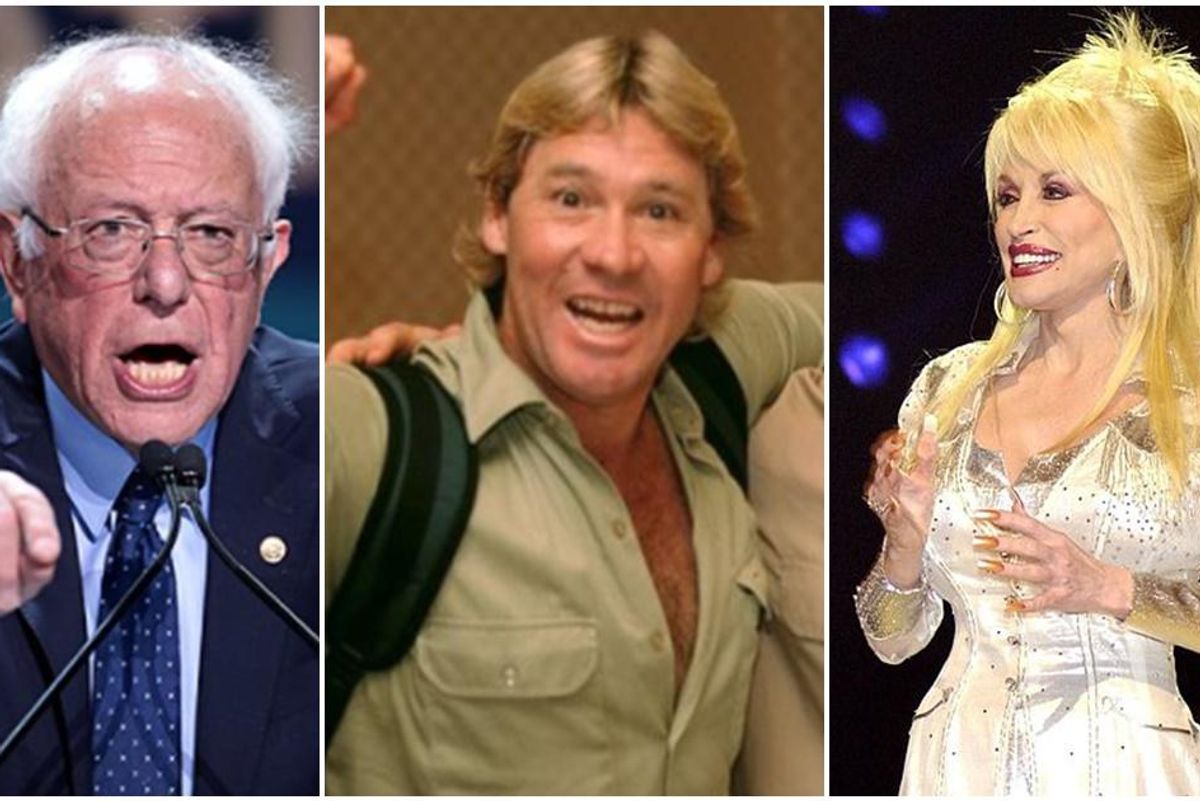'God' asked people who should be sainted next. Here are the top 20 most popular responses.
Who do you think should become a saint?

Bernie Sanders, Steve Irwin, Dolly Parton.
It's hard to pin down the exact number of people who have been canonized or beatified by the Catholic church, but scholars say the number may be beyond 10,000. The most recent canonization by Pope Francis was Margherita della Metola in April of this year.
Margherita della Metola was an Italian Roman Catholic and professed member of the Third Order of Saint Dominic who lived 1287 to 1320.
A satirical Facebook page for God a.k.a. The Good God Above has nearly 4 million followers and he asked them an important question on November 1: "I have not canonized any new saints in a while. Any suggestions?"
The post received more than 9,000 responses of people debating which modern-day heroes are so holy they deserve to become saints. We decided to rank the top 20 vote-getters based on how many likes they received after being nominated by a commenter.
The number one vote-getter won by a landslide.
(Note: Some people were mentioned multiple times, so the numbers on the posted comments aren't the only numbers that we considered.)
Here are the top 20 people "God's" followers believe should become saints.
Alex Trebek (1940 - 2020)

via Facebook/The Good God Above
"Who should be a saint?" for $800, Alex. Trebek was the host of "Jeopardy!" for 37 years and one of the most recognizable TV personalities of all time. He should be canonized for his calm presence on one of TV's most tense game shows.
Lemmy Kilmister (1945 - 2015)

Ian Fraser Kilmister was known worldwide by one name: Lemmy. The lead singer and bassist of Motörhead should be canonized for partying as hard as he rocked. "I don't do regrets," Lemmy once said. "Regrets are pointless. It's too late for regrets. You've already done it, haven't you? You've lived your life. No point wishing you could change it."
George Takei (1937 - )

Takei has had one of the greatest second acts in American life. He became a sci-fi legend and one of the first Asian-American TV stars in the late '60s as Sulu on "Star Trek." In the social media era he's become one of the most popular faces of trending content. He should be canonized for the incredible work he's done for the LGBTQ community.
Pope Francis (1936 - )

Born Jorge Mario Bergoglio, Pope Francis has been one of the most popular and controversial Popes of the modern era for his unapologetically progressive views. He should be canonized for his work on climate change reform.
Sir Terry Pratchett (1948 - 2015)

Pratchett was an English humorist, satirist and author of comic fantasy novels, including the "Discworld" series. He should be canonized for celebrating all of the quirky and strange things that happen in "real life."
Brandon Stanton (1984 - )

Stanton is an American author, photographer and blogger best known for "Humans of New York," a photoblog and book. He should be canonized for his portraits of strangers who share intimate stories of strength, addiction, redemption, regret and love.
David Bowie (1947 - 2016)

Bowie is one of the most enigmatic performers of the past century whose work highlighted the concept of the outsider, whether it was an astronaut in space or someone living outside of traditional gender norms. Bowie should be canonized for showing humanity that there are no limitations on who they can be and how they can change.
Sir David Attenborough (1926 - )

Sir David Attenborough is the undisputed father of the nature documentary. Throughout his eight-decade career, his gentle, awestruck voice has served as humanity's guide to nature. He should be canonized for "Life on Earth," his series that examined the role of evolution in nature.
Dr. Anthony Fauci (1940 - )

Dr. Fauci, the director of the National Institutes of Health, has come to the forefront of American life for his leadership during the COVID-19 pandemic. He should be canonized for not losing his mind during former president Trump's long, rambling and factually inaccurate COVID briefings in 2020.
Ruth Bader Ginsburg (1933 - 2020)

The "Notorious RBG" became a liberal, feminist icon for championing women's rights as a member of the U.S. Supreme Court from 1993 to her death. She should be canonized for her strongly worded dissents in women's rights cases.
Robin Williams (1961 - 2014)

Williams was one of the most unique performers the world has ever seen. He completely changed American comedy with his intense, high-energy improvisational comedy performances on stage, TV and in film. He was also a talented actor, winning critical acclaim in films such as "Good Morning Vietnam," "Mrs. Doubtfire" and "Dead Poets Society." He should be canonized for his child-like love of whimsy.
Bob Ross (1942 - 1995)

Ross was the creator and host of "The Joy of Painting," an instructional television program that aired from 1983 to 1994 on PBS. His infectious love of art, distinctive hair and gentle voice made him the ultimate calming presence. He should be canonized for teaching the world how to paint "happy little trees."
Elon Musk (1971 - )

Musk is the closest we'll have to a living Bond villain. He's a visionary billionaire who isn't shy about wanting to change the world, from how we travel to spend money. Like him or not, he should be canonized for creating the Tesla, a high-performance electric car that brought EVs into the mainstream.
George Carlin (1937 to 2008)

Carlin came to prominence as a counter-culture comic in the '70s where he was famous for outlining the "seven dirty words you can't say on television." However, clips of him from the late '90s and early 2000s where he eviscerates American greed, materialism and entitlement have made him still relevant to this day. He should be canonized for this incredible clip where he discusses the fact that there's a big club and "you're not in it."
"It's called the American Dream because you have to be asleep to believe it."
George Carlin - It's A BIG Club & You Ain't In It!
Fred Rogers (1928 - 2003)
Rogers touched the lives of countless children from 1968 to 2001 as the host of PBS' "Mister Rogers' Neighborhood." The puppeteer, songwriter and Presbyterian minister revolutionized children's television and should be canonized for changing the way we think about the inner lives of young children.
Jimmy Carter (1924 - )

Carter served as president of the United States from 1977 to 1981 and his biggest accomplishment was the Camp David Accords that ended the Israeli-Egyptian disputes. His post-presidency life has been dedicated to humanitarianism causes through the Carter Center and Habitat for Humanity. Carter was awarded the Nobel Peace Prize in 2002.
Carter should be canonized for his humility and commitment to service.
Steve Irwin (1962 - 2006)

The "Crocodile Hunter" wowed audiences by fearlessly tangling with deadly snakes, spiders, lizards and crocodiles. But at his heart, he was a true lover of nature and wildlife, and an educator who shared his knowledge and enthusiasm for animals with millions. Irwin should be canonized for his many contributions to the field of wildlife education and conservation.
Dolly Parton (1946 - )

Parton is such a national treasure that when they began pulling down Confederate statues in Tennessee a few years back, there was a petition to have them replaced with statues of Dolly. As a musician, Parton has sung some of the biggest hits in country music history, including "I Will Always Love You" and "Islands in the Stream." But she has also been a generous philanthropist, helping charities that benefit children and veterans.
If you got the COVID-19 vaccine you should thank Dolly. In 2020, she donated $1 million to help fund vaccine research at Vanderbilt University Medical Center.
Dolly should be canonized for creating the Imagination Library that has donated more than 100 million books to children.
Bernie Sanders (1941 - )

Vermont Senator Bernie Sanders is one of the most beloved political figures in the United States because he has always stood on the side of the oppressed and the working class regardless of whether it was popular. He's refused to be bought by Wall Street and has stood up against the Department of Defense, the fossil fuel industry, drug companies and private prison industries.
He should be canonized for his relentless quest to provide healthcare for all Americans.
Keanu Reeves (1964 - )

Reeves is a beloved figure in Hollywood because of his kind, down-to-earth nature. There are countless anecdotes around the internet of Reeves going out of his way to please a fan or inviting a member of the paparazzi to his table to sit with him during dinner. "The internet's boyfriend" is also a gentleman who never touches women when taking a photo with them.
Reeves should be canonized for quietly donating millions to children's hospitals.
- What this Mormon campaign for refugees can teach us all about faith ... ›
- A woman's viral post about sitting next to these two kids at a Saints ... ›
- Why is 37 the world's most popular 'random' number? - Upworthy ›
- 'Made me smile': President Jimmy Carter’s thoughts about the Bible and homosexuality resurfaces - Upworthy ›







 A woman is getting angry at her coworker.via
A woman is getting angry at her coworker.via  A man with tape over his mouth.via
A man with tape over his mouth.via  A husband is angry with his wife. via
A husband is angry with his wife. via 
 Austin Powers impersonator arrives at Chase Hofer's apartment.Photo Credit: Kenneth Webb, TikTok
Austin Powers impersonator arrives at Chase Hofer's apartment.Photo Credit: Kenneth Webb, TikTok
 Mom hugging crying daughter
Mom hugging crying daughter Dad kissing child on cheek
Dad kissing child on cheek Mom comforting daughter
Mom comforting daughter

 A blue light painting of an infinity symbol. Photo by
A blue light painting of an infinity symbol. Photo by